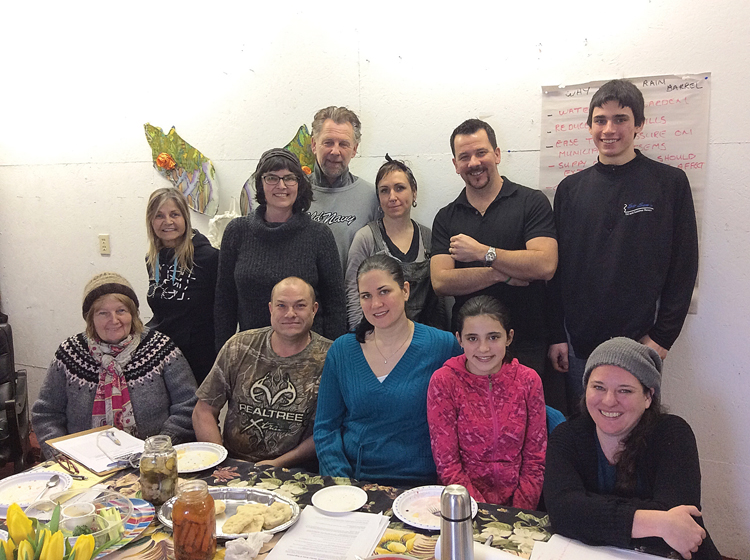|
Bancroft this Week https://www.bancroftthisweek.com/community-gardens-offer-more-than-food/ Export date: Mon Mar 31 6:10:57 2025 / +0000 GMT |
Community gardens offer more than food Part of a group of residents interested in community gardening in North Hastings who attended a meeting on Feb. 20 at A Place for the Arts in Bancroft with Jill Bishop, community food cultivator with the Nourish program in Peterborough. JIM EADIE Special to This Week By Jim Eadie If Jane Kali had her way, there would be vegetable gardens everywhere throughout the area, with everyone having access to grow some of their own food. Kali is the program co-ordinator for the North Hastings Community Trust, and one of the partners in the local Harvest the North initiative. Among other things, Harvest the North established the successful gardens at Riverside Park last summer, and has plans to increase the garden spaces this summer, and add new locations in the Town of Bancroft. On Feb. 20, a gathering of over a dozen interested people was held at A Place for the Arts to hear an expert on community gardens offer her wisdom and experiences. Jill Bishop is an urban farmer in Peterborough, and was with the Community Gardening Network there. This group has subsequently folded into the “Nourish” program, where Bishop is the community food cultivator. The Nourish community “recipe” is to promote growing, cooking and eating local food, and to develop all the intersections between them. She defines a community garden as “a communal space for people to come together to grow food.” Last year, Peterborough had 41 local community gardens, “a higher number than Vancouver,” she said, “and a massive accomplishment.” Gardens were located on federal, provincial and municipal properties, as well as schools, churches and business locations. In all, this amounted to 509 individual plots, and more than 700 gardeners. “One garden location alone, containing 20 10-by-10 plots, grew 3,500 pounds of food, with an estimated retail value of almost $9,000,” she said. She estimates that approximately $360,000 worth of food was grown by the community in the gardens last summer. Collaboration was the key that Bishop kept stressing, and related some stories from the Peterborough experience. “We have beautiful gardens right across from Peterborough city hall … a very high profile location with people walking, riding bicycles, and politicians coming by,” she said. The gardens are on a school property. “There is the lift-lock community garden just below the locks. It is a lower income area where food security is an issue … but there is great community pride in the project,” she said. “The fire department has helped out with watering, and had fun with the kids. Children pick some beans, and organize little parties in the garden.” One school has established a garden between two portables in what turns out to be a perfect gardening micro-climate. “These are a class of high-needs students, and as of last year they had built up a crop of 20 different varieties of garlic. The kids are very excited about it,” she said. Bishop noted that on school properties, it is important to connect with community members to keep gardens maintained during the summer. There are 10 schools with community garden space. “I suggest you start with smaller gardens at first,” said Bishop. “They can be maintained and will look really nice, and the visible effort builds support.” “People often worry about the aesthetics, and they always ask about vandalism and theft,” she noted, adding that neither had proven to be a major problem in Peterborough. “The hope is to use underutilized spaces; to attract bees, birds and butterflies; to get people outside more; and to provide the opportunity for mentoring. It's great to watch people fall in love with growing things,” she said. “We know that gardens build communities. They provide a safe place for interaction, provide a common bond (gardening), have a positive effect of crime rates, and develop pride in community and interest in neighbourhood,” said Bishop. Bishop described one group of gardeners, calling themselves the “gangster gardeners.” “They were a group of youths who grew and donated all of their food to a food bank,” she said. “And delivered it all by bicycle.” One participant at the Bancroft meeting described the positive impact of growing food in their garden. “It has had a big impact on our children,” she said. “We have all of these pictures of our kids with giant leaves of kale … and dirty carrots.” Another described the reaction of his child: “Daddy, daddy, daddy … we are so rich in beans!” Discussion around the table included further community engagement, with possible workshops for new gardeners, as well as sessions on handling, storing and eating food. One collaboration mentioned by Bishop was their connection to COIN, a program in Peterborough working with underemployed youth or youth at risk, teaching skills required for working in kitchens and food preparation. “And you must celebrate your gardens,” she said. “Throw some parties, invite people to your garden, have a barbecue, have tours, have garden meetings, do a documentary …. you will pull in people who may not be traditionally gardeners.” Further information can be obtained by contacting Jane Kali at North Hastings Community Trust (613-339-1100). |
| Excerpt: If Jane Kali had her way, there would be vegetable gardens everywhere throughout the area, with everyone having access to grow some of their own food. |
|
Post date: 2016-02-25 11:50:33 Post date GMT: 2016-02-25 16:50:33 Post modified date: 2016-02-24 11:54:42 Post modified date GMT: 2016-02-24 16:54:42 |
|
Export date: Mon Mar 31 6:10:57 2025 / +0000 GMT This page was exported from Bancroft this Week [ https://www.bancroftthisweek.com ] Export of Post and Page has been powered by [ Universal Post Manager ] plugin from www.ProfProjects.com |